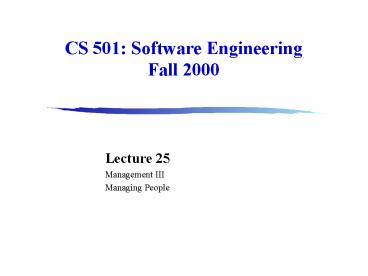CS 501: Software Engineering Fall 2000 - PowerPoint PPT Presentation
Title:
CS 501: Software Engineering Fall 2000
Description:
Return of laptops and wireless cards - Dates for return will be announced on 'Notices' ... Send email to rosemary_at_cs.cornell.edu if you plan. to take the early ... – PowerPoint PPT presentation
Number of Views:35
Avg rating:3.0/5.0
Title: CS 501: Software Engineering Fall 2000
1
CS 501 Software EngineeringFall 2000
Lecture 25 Management III Managing People
2
Administration
Return of laptops and wireless cards -gt Dates
for return will be announced on "Notices" -gt
All equipment must be returned before the
examination. Bring the receipt to the
exam. -gt If an extension granted, (e.g.,
independent research) must
return and be issued again If any repairs
needed, please swap for replacement since
warranty runs out on December 15.
3
Administration
Early examination December 7, 1000 to 1130,
Upson 5130 Send email to rosemary_at_cs.cornell.edu
if you plan to take the early
examination, by December 5 All laptops and
wireless cards must be returned
before the examination
4
Administration
See "Assignments" for information about final
presentation and documentation -gt Schedule time
with client and teaching assistant -gt Must
demonstrate operational system -gt Presentation
must include hand-over procedure to client
5
Managing People
Theoretical Organizational behavior
Industrial psychology Group behavior
Cognitive fundamentals Economic motivation
6
Maslow's Hierarchy of Needs
Self-realization needs
Esteem needs
Social needs
Safety needs
Physiological needs
7
Software Engineering Basics
Professional staff are the major cost of
software Professional staff vary greatly in
productivity gt Ability gt Education and
training gt Motivation gt Interaction with
colleagues and leaders gt Work environment
People are productive when happy and happy when
productive
8
Software is Built by Teams
Best size for a team is 3 to 8 people
Team members may include developers (from
trainee to expert) domain experts graphic or
interface designers software librarians testers
Teams must have administrative leadership
(manager) technical leadership
9
Group Working
20 non-productive
50 interaction with others
30 working alone
10
Communication
Informal Kitchen, smokers' doorway, after
work, etc. Walkabout (tours) Ad hoc meetings
Staff meetings (non-technical) Example
Tektronics Technical meetings Facilitation
Record of decisions
11
Administrative Leader (Manager)
Personnel Assigning tasks Hiring,
promoting, etc. Resources Budgets Space,
facilities Equipment Project
management Relationships with other teams and
clients Project plan and schedule
12
Hiring Criteria
Productivity is a combination of Analytic
ability Verbal ability and communication
skills Education Application domain
knowledge Adaptability and inquisitiveness
Personality and attitude Platform
experience Programming language experience
13
Staff Retention
Technically interesting work up to date
hardware and software opportunities to learn and
experiment Feeling of appreciation managemen
t recognition money and promotion Working
conditions space, light, noise,
parking flexibility Organizational dynamics
14
Firmness
Managers must be firm when needed
Assignment of tasks must be equitable and open
everybody will have to tackle some of the dreary
tasks Carrots are better than sticks, but
poor performance must be addressed. Nobody
is indispensable nobody should be allowed to
think that they are indispensable
15
Technical Challenges
Canceling projects Example the Andrew
window manager Changes of environment Exampl
e the World Wide Web Technical tinkering v.
needed re-engineering
16
Turning a Group Around
To turn a weak group into a strong one is the
greatest challenge of leadership The art of
the possible Promotion of the best over the
old leaders Using opportunities to
reorganize Resignations and terminations
Respect people who try, yet refuse to accept
problem areas Brutal and abrupt rarely equals
persistent and firm
17
How to be Led
As a junior member of a team, what can you do to
make it productive?































